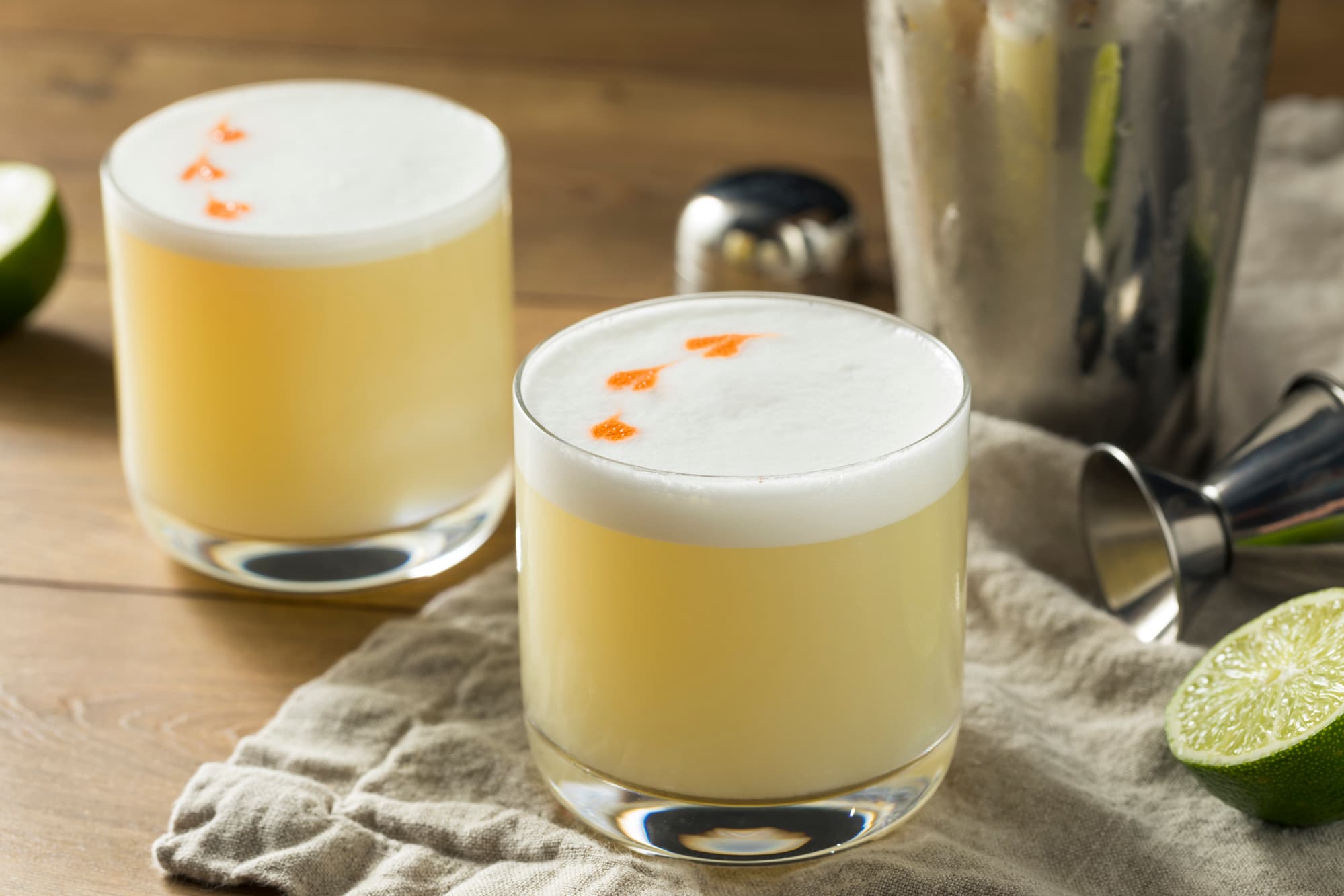Pisco Sour, that unique tangy and frothy cocktail, has captured the hearts of countless cocktail lovers worldwide. Yet did you know that it is more than just a drink?

Pisco Sours hold a special place in the heart of Peruvian culture as it is considered the country’s national drink and a symbol of its rich history. This beloved cocktail is typically made with Pisco – a South American brandy, lime juice, simple syrup, and Angostura bitters and topped with a frothy egg white layer.
The tangy and refreshing taste makes it an ideal beverage for savoring on a hot day in South America. Its unique blend of flavors has made it a popular choice among cocktail enthusiasts.
The Pisco Sour Is Celebrated in Peru
Every year on February 3rd, people all over Peru celebrate their national drink on National Pisco Sour Day. What’s all the fuss about?
Pisco Sours represent the country’s cultural heritage and symbolizes national pride. Its creation dates back to the 1920s, and since then, it has become an essential part of Peruvian identity. During the celebrations, people dress in traditional clothes, dance to local music, and toast their heritage.
How An American Invented The Pisco Sour
The Pisco Sour may be one of Peru’s most notable contributions to the cocktail world, but did you know it has a special relationship with famous people and a particular bar in Lima, Peru? An American expat, Victor Morris, is credited with inventing the beloved drink in the 1920s while running Morris’ Bar in Lima.
The bar quickly became a popular spot for everyone, from politicians to artists to celebrities, and the Pisco Sour became the drink of choice for many of its regulars.
Today, Morris’ Bar is still known for serving up a mean Pisco Sour and remains a must-visit spot for anyone looking to explore the history and culture of Lima’s bar scene. It’s currently called Restaurant Maury, located in Centro Historico, one of the safest areas in the Peruvian city.
While the place has mixed reviews, I had my best Pisco Sour in El Celler de Cler in Trujillo, Peru. If you find yourself near Trujillo, it’s worth visiting the place.
Pisco Sour Recipe
Pisco Sour is your best bet if you’re looking for a refreshing and complex cocktail. Not to mention it’s quite easy to prepare.
Drinking it with Peru’s famous ceviche is considered the ideal pairing because the zesty tang of the seafood dish beautifully complements the liquor, harmonizing the citric notes. With the perfect balance of acidity and spiciness from ingredients like fish, onion, lemon, and hot pepper, this effortlessly counteracts the cocktail’s bittersweet undertones, resulting in a match in heaven.
Gather the ingredients and follow the simple steps below for a perfect sip.
- 1 ½ oz Pisco
- 1 egg white
- 1 oz lemon juice
- ¾ oz simple syrup
- Add 1 ½ oz of Pisco, one egg white, 1 oz lemon juice, and ¾ oz of simple syrup to a cocktail shaker.
- Fill the shaker with ice and shake vigorously for 15-20 seconds. This will create a frothy texture for the cocktail.
- Strain the mixture into a chilled glass.
- Add a few drops of Angostura bitters on top of the frothy mixture.
- Enjoy your delicious Pisco Sour!
Pisco Sour’s Unique Taste Profile
Pisco Sour is a cocktail that boasts a unique taste profile that is difficult to describe in words, but once you take a sip, you’ll understand what the fuss is all about.
The egg white may sound daunting, but it adds a foamy texture that elevates the drink. The result is a sweet and sour concoction with a silky texture that adds to the experience.
Differences Between The Peruvian and Chilean Pisco Sour
The origins of this beloved cocktail are up for debate between Peru and Chile. Earlier, we shared that the original version was created in Peru by an American bartender, Victor Morris, in the 1920s. However, since then, the recipe has gone through many iterations, resulting in the Peruvian and Chilean versions we know today.
The Peruvian version calls for Peruvian Pisco, key limes, and Angostura bitters, while the Chilean version includes Chilean Pisco, leaves the egg whites and bitter, and includes lemon juice. Despite their differences, both variations remain popular around the world.
What is Pisco?
Pisco, the national spirit of both Peru and Chile, is a delightful and interestingly complex liquor. Its origins can be traced back to the 16th century when Spanish conquistadors planted grapevines in the fertile regions of South America, intending to make wine.
However, the wine would spoil due to the high temperatures before returning to Spain. So, the Spaniards began distilling the wine without wanting to waste the precious grapes, resulting in a strong and tasty spirit. Thus, Pisco was born.
Origin of the name
Pisco is a liquor that’s a staple of Peruvian culture and has a name that is steeped in history. It is believed that the term “pisco” comes from the Quechua word “pishku,” meaning “bird.” This is because the Quechuas, an indigenous people of Peru, used to name their towns after local birds.
When Spanish conquistadors arrived in Peru and began producing the liquor in Pisco, they named it after the town. (The town Pisco was initially named after a local chieftain, also named Pisco).
Variations
Are you a fan of Pisco Sours? If so, you may have noticed several different varieties of this classic cocktail.
- Pisco Puro: One option is Pisco Puro, made with a single grape variety and has a more distinct and pure flavor.
- Pisco Acholado: For those who prefer a blend, Pisco Acholado combines two or more grape varieties, resulting in a balanced and versatile cocktail.
- Pisco Aromatico: Another popular choice is Pisco Aromatico, which uses grapes infused with fragrant botanicals to create a unique and complex flavor profile.
- Pisco Mosto Verde: And finally, there’s Pisco Mosto Verde, which is made from grapes harvested before fermentation is complete, resulting in a slightly sweeter, more floral taste.
Pisco Chilcano Recipe
Have you heard of the Pisco Chilcano? This delicious drink has been gaining popularity lately as a worthy contender to the classic Pisco Sour. Although both drinks have roots in Peru, the Chilcano is distinguished by ginger ale instead of egg white, giving it a lighter texture and a refreshing kick.
It has become a popular choice for parties and gatherings, as it is easy to make and can be customized with different mix variations. Some people add herbs like mint or rosemary. In contrast, others prefer a touch of fruit juice.
While both drinks share a common base spirit—Pisco—they differ significantly in flavor and texture. The Pisco Sour is creamy, frothy, and sweet, satisfying any sweet tooth. But for those looking for a lighter, more refreshing drink, the Pisco Chilcano is the way to go.
Made with ginger ale, Pisco Chilcano has a crisp and refreshing taste, making it perfect for the hot summer. Although the Chilcano is often served as a pre-dinner drink, it can also be enjoyed as a refreshing beverage alongside a meal.
And if you want to get creative with your Pisco Chilcano, many variations can be made by mixing in other ingredients like grapefruit, passion fruit, or bitters to add a unique twist.
Here is a simple recipe for Pisco Chilcano:
- 2 oz Pisco
- 4 oz ginger ale
- 1 oz lemon juice
- Ice
- Fill a glass with ice.
- Add the Pisco, ginger ale, and lemon juice to the glass.
- Stir well to combine.
- Garnish with a lemon wedge if desired.
There are also several variations of Pisco Chilcano, such as using lime juice instead of lemon juice or adding a splash of bitters for additional complexity. Overall, Pisco Chilcano is a refreshing, easy-to-make cocktail that offers a delicious alternative to the classic Pisco Sour.
FAQs
This beloved South American drink is made with the perfect combination of Peruvian Pisco (a type of brandy), lime juice, simple syrup, and egg whites. The egg whites give this beverage its signature frothy texture and lovely foam top. And let’s remember the finishing touch—a few drops of bitters which add a delightful pop of color and an extra layer of flavor.
Pisco is a type of Peruvian grape brandy that is distilled from wine.
A Pisco Sour is a cocktail made with Pisco as its base spirit and lime juice, syrup, egg white, and Angostura bitters. The drink has a tart citrus flavor, the Pisco’s smoothness, and the bitters’ earthiness.
No, Pisco is not stronger than tequila. Pisco is typically between 38 and 48 percent alcohol by volume, while tequila is usually between 40 and 50 percent alcohol by volume.
No, as it contains egg whites. However, Pisco Chilcano is vegan since it only contains Pisco, ginger ale, and lemon juice.

⇒ GET OUR FREE 7-DAY VEGAN MEAL PLAN E-BOOK NOW! OR CHECK OUT ALL VEGAN MEAL PLAN RECIPES! ⇐
This article originally appeared on Wealth of Geeks.
Meet Marjolein Dilvan, the founder of Radical FIRE, a personal finance blog that helps you reduce money stress by making more money and investing. She has a finance and economics background with a master’s in Finance. She has quit her job and is currently traveling the world, documenting her travels on Spark Nomad to inspire people to explore the world.



Leave a comment